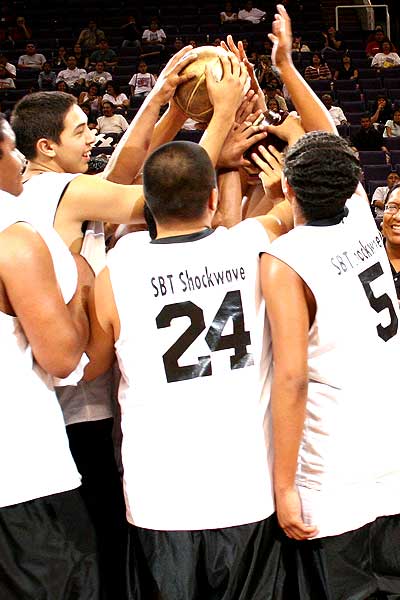 |
Canku Ota
|
 |
|
(Many Paths)
|
||
|
An Online Newsletter
Celebrating Native America
|
||
|
May 1, 2009 - Volume
7 Number 5
|
||
|
|
||
|
Not Just Basketball.
Rez Ball.
|
||
|
by Debra Utacia Krol
for NewsPlink.com
|
||
|
Across the nation, Indian kids are dribbling, weaving and jumping, and pretending to be Michael Jordan. Sometimes they’re playing on a pristine court in the local school gym; other times, they’re making their move for hoop glory under a bright blue sky on a packed dirt “court” with an ancient, rusting hoop attached to the side of a barn, with a slowly-leaking ball that has to be pumped up periodically. No matter how poor a community may be, parents scrimp and save to get to games to cheer their kids on. Teams named the Winslow Bulldogs, Hopi Bruins, or San Carlos Braves go head-to-head to bring home coveted state championship trophies, traveling as many as eight hours on a converted old bus to play teams in Window Rock, Snowflake, Casa Grande or Flagstaff. Tribal newspapers always devote lots of room to report the latest game stats. Even KTNN, the Navajo Nation’s radio station, broadcasts Phoenix Suns games in the Navajo language. Right now, hoop junkies are preparing for July’s tribal basketball extravaganza. The Native American Basketball Invitational, or NABI, is the closest thing the United States has to a national high school championship for American Indians. High school? Right – it seems that scouts could never quite grok that the next LeBron James could be lurking inside a rez high school, so these potential hoop stars haven’t yet had access to college sports. They still don’t know that the excitement of trying for three-point long shots while the crowd screams their names isn’t necessarily a winning strategy. Tex G. Hall was one of those young players who aspired to the pros. But he never got the grooming, coaching, scholarships or national attention that a top college program gives to its stars, so he never made it. He went on to become chairman of the Mandan, Hidatsa and Arikara Nation, otherwise known as the Three Affiliated Tribes. And now, he is the honorary president of NABI, to see if he can’t help the younger generation reach hoop heaven. NABI was started in 2003, and it’s grown into the country’s largest Native American basketball tournament. Men’s and women’s teams from high schools across the continent converge on Phoenix every year to vie for top honors. The competition has also garnered the support of the Phoenix Suns, sports manufacturing giant Nike, and tribes and enterprises. The finals are played on the boards of the Suns’ home turf, the U.S. Airways Center. NABI’s efforts and unvarnished thrills are beginning to bear fruit. The NCAA finally awarded NABI with a coveted certification in 2007, and now college coaches are beginning to troll for talent. Anthony Brown, of the Cheyenne-Arapaho Tribe, was the tournament’s Most Valuable Player in 2003. He signed to play pro basketball in Spain. Others are now making their way through college ball. The next hoop legend could be practicing free throws right now on a rusty old hoop with a half-flat basketball on a dirt court. NABI tickets are only $10; you could see it happen yourself. Debra Utacia Krol, an enrolled member of the Xolon (or Jolon) Salinan Tribe of central California, is a freelance journalist based in Arizona. |
|
|
||
|
|
||
| Canku Ota is a free Newsletter celebrating Native America, its traditions and accomplishments . We do not provide subscriber or visitor names to anyone. Some articles presented in Canku Ota may contain copyright material. We have received appropriate permissions for republishing any articles. Material appearing here is distributed without profit or monetary gain to those who have expressed an interest. This is in accordance with Title 17 U.S.C. Section 107. | ||
|
Canku Ota is a copyright ©
2000, 2001, 2002, 2003, 2004, 2005, 2006, 2007, 2008, 2009 of Vicki
Barry and Paul Barry.
|
||
 |
 |
|
|
The "Canku
Ota - A Newsletter Celebrating Native America" web site and
its design is the
|
||
|
Copyright ©
1999, 2000, 2001, 2002, 2003, 2004, 2005,
2006, 2007, 2008 of Paul C.
Barry.
|
||
|
All Rights Reserved.
|
||
 “Rez
ball” is what we like to call basketball. It’s a major
obsession in Indian Country, and when March Madness is over, we
are still gearing up for the Native American Basketball Invitational,
held in Phoenix from July 8 – 10. It’s precisely why air
conditioning was invented.
“Rez
ball” is what we like to call basketball. It’s a major
obsession in Indian Country, and when March Madness is over, we
are still gearing up for the Native American Basketball Invitational,
held in Phoenix from July 8 – 10. It’s precisely why air
conditioning was invented.